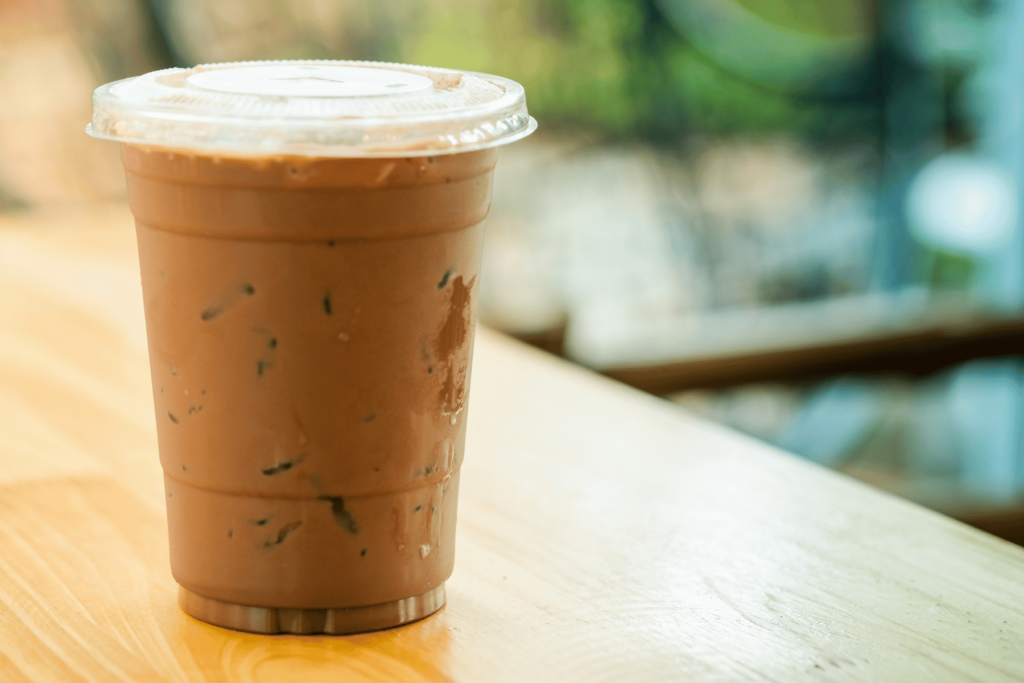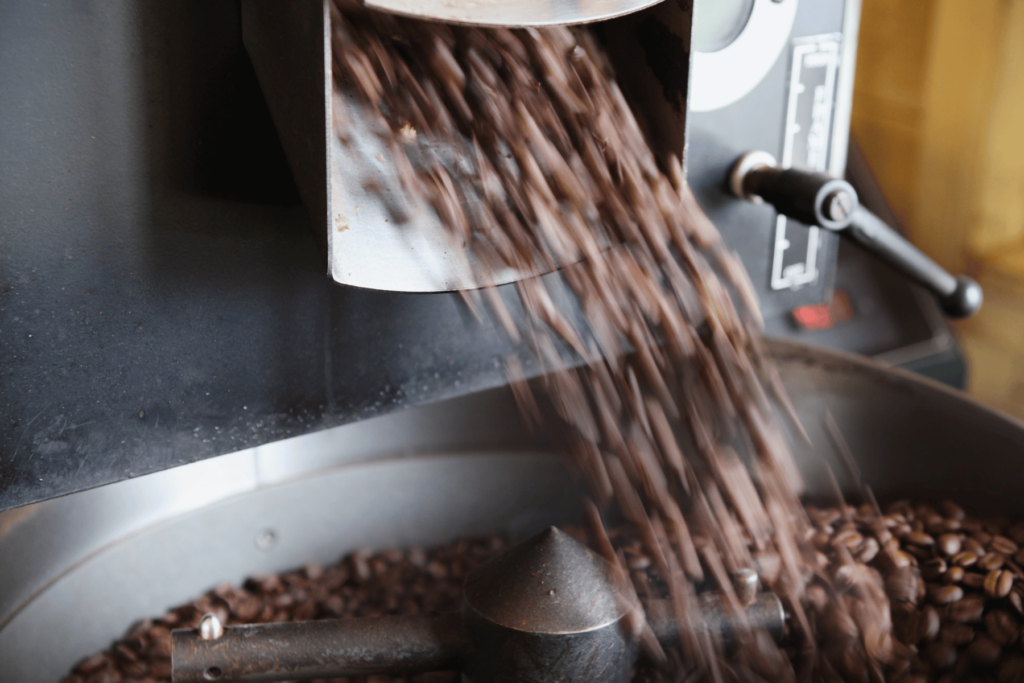Because my 11-year-old daughter loves the taste of coffee, I went down the coffee rabbit hole and want to share what I found with you.
First, it is generally considered safe for kids to drink decaffeinated coffee. Like everything, it has to be in moderation.
There is a small amount of caffeine in decaf coffee (usually around 2 to 5 mg per 8-ounce cup). Regular coffee can contain around 70-140 mg of caffeine per 8-ounce cup.

Can Kids Drink Decaf Coffee?
The American Academy of Pediatrics (AAP) states that caffeine is not recommended for children because it can have potentially negative side effects on their developing bodies and minds.
Caffeine can cause increased heart rate, jitteriness, and sleep disturbances, which are concerning in young children. However, the AAP has not specifically addressed decaf coffee, and it is generally assumed that the low caffeine content in decaf coffee makes it less problematic than regular coffee or other drinks with more caffeine.
Some include:
Sodas
Many popular sodas contain caffeine. The caffeine content can vary depending on the brand and type, but it generally ranges from 20 to 40 mg per 12-ounce can. Some sodas also come in larger containers, which may have higher caffeine content.
Iced Tea
Some varieties of iced tea, including sweetened and flavored versions, contain caffeine. The caffeine content in iced tea can vary widely, but it is generally lower than that in sodas. A typical 8-ounce serving of iced tea may contain around 20 to 30 mg of caffeine.
Energy Drinks
Energy drinks are not recommended for children due to their high caffeine content and other stimulants. These drinks are designed to provide a quick energy boost and often contain significantly higher levels of caffeine than other beverages. Some energy drinks can contain 100 mg or more of caffeine per 8-ounce serving.
Flavored Water
Some flavored water beverages aimed at children may also contain caffeine. These drinks can be misleading as they might be marketed as healthy alternatives, but they can still contain significant amounts of caffeine.
Iced Coffee
Some iced coffee beverages, including those with added flavors or sweeteners, can contain varying levels of caffeine. The caffeine content can range from 50 to over 100 mg per 8-ounce serving, depending on the brand and preparation method.
Hot Chocolate
While traditional hot chocolate itself is not a significant source of caffeine, some commercial mixes and instant hot chocolate products may contain added caffeine. However, the caffeine content in these products is generally lower than that in coffee or soda.

That being said, it is essential to remember that individual children may react differently to caffeine, even small amounts of caffeine. Some children may be more sensitive to caffeine’s effects, while others may not experience any adverse effects.
As a parent or caregiver, it’s crucial to monitor your child’s reaction to decaf coffee or any caffeinated beverage and make an informed decision based on their health and well-being.
If you are unsure about giving decaf coffee to your child or have concerns about caffeine consumption, it’s always a good idea to consult with a pediatrician or a healthcare professional.
Now, let’s brush up on our coffee education, shall we?
As we know, there are two primary variants: coffee with caffeine and decaf coffee.

The Caffeine Content
Caffeinated coffee contains varying amounts of caffeine, typically ranging from 70 to 140 milligrams per 8-ounce cup. This natural stimulant gives coffee its characteristic “pick-me-up” effect, boosting alertness and energy levels.
On the other hand, decaf coffee, short for decaffeinated coffee, undergoes a process to remove most of its caffeine content. As a result, decaf coffee contains only a fraction of the caffeine found in regular coffee.
On average, an 8-ounce cup of decaf coffee contains about 2 to 5 milligrams of caffeine, making it a suitable choice for those seeking to limit their caffeine intake.
The Decaffeination Process
Decaf coffee is not caffeine-free. It has had a significant portion of its caffeine removed. Several methods are used to decaffeinate coffee beans, including:
a. Direct Solvent Method
In this process, the green coffee beans are steamed, and then a solvent (usually ethyl acetate or methylene chloride) is used to dissolve the caffeine. The solvent is then removed, leaving behind decaffeinated coffee beans.
b. Swiss Water Process
This method uses only water to decaffeinate the beans. The green coffee beans are soaked in hot water to remove the caffeine, and the water is then passed through activated charcoal filters to remove the caffeine molecules while preserving the coffee’s flavor compounds.
c. Carbon Dioxide (CO2) Method
In this approach, carbon dioxide is used to extract caffeine from the coffee beans. The CO2 is compressed into a liquid and passed through the coffee, where it binds with caffeine. The CO2 is then evaporated, leaving behind decaffeinated coffee beans.

Flavor and Aroma
Another critical factor that sets these two types of coffee apart is their flavor profile. Caffeinated coffee is known for its bold, robust flavors and stimulating aroma, which coffee enthusiasts often seek to kick-start their day.
Decaf coffee, due to the decaffeination process, may have a slightly altered taste compared to its caffeinated counterpart. Some people detect subtle differences in flavor, but advancements in decaffeination techniques have significantly improved the taste and aroma of decaf coffee in recent years. Many brands now offer decaf coffee options that closely resemble the taste of regular coffee.
Health Considerations
The caffeine in regular coffee can have both positive and negative effects on health. On the positive side, moderate caffeine consumption may enhance cognitive function, improve mood, and provide a temporary energy boost.
However, excessive caffeine intake can lead to issues like insomnia, jitteriness, increased heart rate, and digestive problems. For some individuals, caffeine may trigger anxiety or headaches.
Decaf coffee, with its minimal caffeine content, provides an option for those who enjoy the taste and ritual of coffee but want to reduce their caffeine intake. It is generally considered a safer choice for children, pregnant women, and individuals sensitive to caffeine.
Now, let’s go deeper into the health benefits of coffee.

For many people, starting the day with a cup of freshly brewed coffee is a morning ritual. My husband uses this Keurig each morning.
Besides being a pick-me-up, coffee has garnered a reputation for offering numerous health benefits. Over the years, scientific research has shed light on the positive impact of this beverage on our well-being.
Antioxidant Powerhouse
Coffee is brimming with antioxidants, which are essential compounds that help neutralize harmful free radicals in the body. Free radicals can cause oxidative stress, contributing to cellular damage and aging.
The antioxidants in coffee, such as chlorogenic acid, can help counteract this oxidative stress, potentially reducing the risk of chronic diseases like heart disease, cancer, and diabetes.
Enhanced Cognitive Function
The caffeine in coffee is a natural stimulant that not only boosts alertness but also enhances cognitive function. Studies have shown that moderate caffeine consumption can improve focus, attention, and mental performance.
Additionally, coffee may have a protective effect against age-related cognitive decline, reducing the risk of neurodegenerative diseases like Alzheimer’s and Parkinson’s.
Mood Booster
Many have experienced the mood-lifting effects of a well-brewed cup of coffee. The caffeine in coffee stimulates the release of neurotransmitters like dopamine and serotonin, which are associated with feelings of pleasure and happiness.
Cardiovascular Benefits
Contrary to the old belief that coffee is bad for the heart, research suggests that moderate coffee consumption may actually have cardiovascular benefits.
Studies have found that coffee intake is associated with a reduced risk of heart disease and stroke. The antioxidants in coffee help improve blood vessel function, lower inflammation, and regulate blood pressure, all of which are crucial for heart health.
Liver Protection
The liver is a vital organ responsible for detoxification and metabolism. Coffee consumption has been linked to a lower risk of liver diseases, including liver cirrhosis and liver cancer.
Regular coffee intake may also reduce the risk of developing non-alcoholic fatty liver disease (NAFLD) by promoting healthy liver function.
Type 2 Diabetes Prevention
Coffee may play a role in reducing the risk of developing type 2 diabetes. Several studies have shown that moderate coffee consumption is associated with a lower risk of developing this metabolic disorder.
The antioxidants and other bioactive compounds in coffee can improve insulin sensitivity and glucose metabolism, thus promoting better blood sugar control.
With all the benefits mentioned, still kids should opt for decaf to avoid having too much caffeine.

In today’s fast-paced world, caffeine has become an integral part of many people’s daily lives. From coffee and soda to energy drinks and teas, this stimulant finds its way into various beverages and products. However, when it comes to kids, it’s essential to be cautious about their caffeine intake.
Disruption of Sleep Patterns
One of the most significant concerns regarding caffeine consumption in kids is its impact on sleep patterns. Caffeine is a central nervous system stimulant, and its effects can linger in the body for several hours.
For children, whose developing bodies and brains require ample rest, consuming caffeine can lead to difficulties falling asleep or staying asleep. Lack of sufficient sleep can affect a child’s mood, behavior, and overall well-being.
Jitters and Anxiety
Children are more sensitive to caffeine than adults, and even small amounts can cause increased heart rate, nervousness, and jitters. This jittery feeling can be unsettling for young kids and may lead to anxiety, especially in those who are more susceptible to its effects.
Adverse Impact on Bone Health
Caffeine can interfere with the absorption of calcium, an essential mineral for growing and maintaining healthy bones. Excessive caffeine intake may contribute to reduced bone density in children, potentially increasing the risk of fractures and bone-related issues.
Negative Impact on Hydration
Caffeine is a diuretic, which means it can increase urine production and lead to dehydration if not adequately balanced with fluid intake. In children, who are more susceptible to dehydration than adults, consuming caffeinated beverages without enough water can be particularly problematic.
Emotional and Behavioral Changes
Caffeine’s stimulant properties can lead to changes in a child’s behavior and emotions. In some cases, kids may experience mood swings, irritability, and difficulty concentrating. These effects can disrupt their daily routines and interactions with others.
Unhealthy Eating Habits
Caffeinated beverages, especially those with added sugars, can contribute to unhealthy eating habits in children. Regular consumption of sugary caffeinated drinks may displace healthier beverage options, such as water or milk, and lead to an increased intake of empty calories and added sugars.
Developing Tolerance and Dependence
Regular consumption of caffeine can lead to the development of tolerance, where the body becomes accustomed to the stimulant’s effects. As a result, children may require increasing amounts of caffeine to achieve the same effects, potentially leading to dependence on this stimulant at a young age.

While adults may enjoy their daily dose of caffeine to help kick-start their mornings or stay alert during the day, it’s crucial to recognize that children’s bodies are not as equipped to handle this stimulant.
As parents and caregivers, it’s essential to monitor and regulate children’s caffeine intake, ensuring they have a balanced and healthy diet without the need for caffeine stimulation.
Instead, encourage them to embrace other beverage choices with less caffeine or no caffeine like water, milk, or natural fruit juices.
